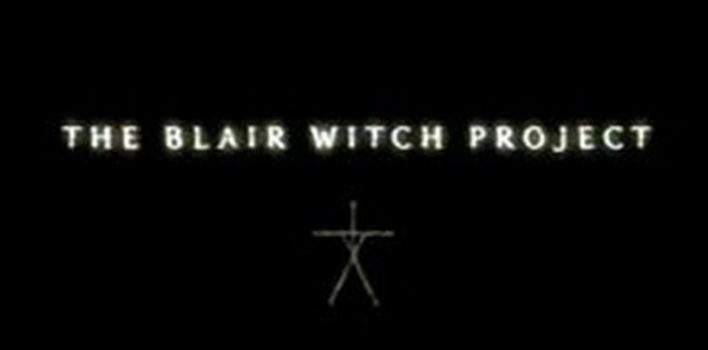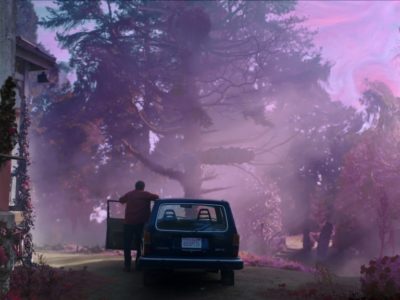Oh! The Horror… of ‘The Blair Witch Project’ (1999) & ‘Book of Shadows: Blair Witch 2’ (2000)
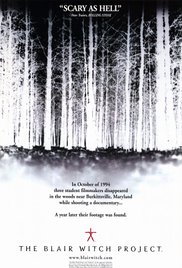 The Blair Witch Project’s promotional attack in 1999, leading up to its July release, was a marvel on the levels of The Exorcist and The Texas Chain Saw Massacre. Matter of fact, it may have been the perfect combination of the two: an immersive campaign of blurring the lines between reality and mythology and people getting physically ill during and after the film. However, in another way, it felt like the last gasp of an era; a final celebration of pre-viral, pre-Google promotional marketing. It is impressively difficult to pull the wool over peoples’ eyes like that in this day and age. The general trend has swung the pendulum from releases shrouded in mystery to a culture that thrives on anticipation. Films are slated years in advance and most information can be looked up with a simple keyword search online.
The Blair Witch Project’s promotional attack in 1999, leading up to its July release, was a marvel on the levels of The Exorcist and The Texas Chain Saw Massacre. Matter of fact, it may have been the perfect combination of the two: an immersive campaign of blurring the lines between reality and mythology and people getting physically ill during and after the film. However, in another way, it felt like the last gasp of an era; a final celebration of pre-viral, pre-Google promotional marketing. It is impressively difficult to pull the wool over peoples’ eyes like that in this day and age. The general trend has swung the pendulum from releases shrouded in mystery to a culture that thrives on anticipation. Films are slated years in advance and most information can be looked up with a simple keyword search online.
I was fifteen at the time of The Blair Witch Project’s release so it was “legally” off limits to me and I doubt my parents would have taken me to see it either. However, I do remember being caught up in the marketing of the film, tangentially, because of all of the older people and friends I knew who saw it and earnestly believed the “true story “of three filmmakers mysteriously disappearing into those Maryland woods. I didn’t end up seeing it for another 10 years and some change. I, similarly, didn’t see Book of Shadows: Blair Witch 2—itself a flop with both critics and the general populace— when it came out. This last Sunday morning, I was able to reappraise the original and finally view the sequel when I pulled a double feature before church clutching black coffee in hand.
I did not care for The Blair Witch Project when I initially saw it. From what I remember about my first viewing, I was pretty hopelessly bored with the film until the very end when the remaining two filmmakers go into the dilapidated house to meet their end. I got a sudden boost of excitement followed by a sudden drop when the screen went black. Maybe I really did need to see it when it came out in the midst of its subversive promotional packaging and/or maybe my sense of cinematic aesthetic was woefully underdeveloped, all I know is I was not impressed.
The good news is: on my most recent viewing of it, I found an appreciation for the formal elements of it and how it was able to sustain a suffocating tension throughout its runtime. Even it’s ending worked a little better for me this time. Rejoice!
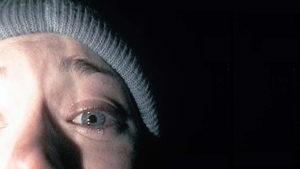 The bad news: I still don’t consider it to be a film that warrants classic status within the modern horror canon. It feels like a film where the audience’s enjoyment of it cannot ultimately be severed from its marketing tactics. Even now, I feel like those staunch defenders cannot speak of its qualities without referencing, on some level, its introduction into modern cultural parlance. It’s important not as much as a film as it is as a prophetic moment of commentary in horror cinema. Such is the position of a guy who didn’t get to experience it in its natural habitat. Don’t worry, I see your side eye and raise you a knowing smirk.
The bad news: I still don’t consider it to be a film that warrants classic status within the modern horror canon. It feels like a film where the audience’s enjoyment of it cannot ultimately be severed from its marketing tactics. Even now, I feel like those staunch defenders cannot speak of its qualities without referencing, on some level, its introduction into modern cultural parlance. It’s important not as much as a film as it is as a prophetic moment of commentary in horror cinema. Such is the position of a guy who didn’t get to experience it in its natural habitat. Don’t worry, I see your side eye and raise you a knowing smirk.
However, I can say in accordance with critics and viewers alike that Book of Shadows was a misstep. A misstep, though, in the way you might not think. I actually found the conceit to be an interesting inverse of the original’s program. It’s the execution, pacing and acting that sealed its fate. Let me make my case.
Two new filmmakers on a small budget with some scrappy promotional people behind it made The Blair Witch Project. Neither Eduardo Sánchez nor Gregg Hale had little, if any, experience making documentaries. Yet they set out to make a film about filmmakers making a documentary and it going horribly, horribly wrong. This is smart filmmaking, the type that is able to tap into the undercurrents of a society and culture that was going through some technological upheavals with the growing prevalence of the Internet. If The Blair Witch Project succeeds at anything, it certainly succeeds at blurring the lines of truth between fact and perception, media/medium and experience on the ground.
There are three levels of intrigue going on here. First, we have Heather, Mike and Josh setting out to find the truth about the Blair Witch mythology by interviewing townsfolk and eventually going into the woods to see for themselves. They are taking formal and informal footage the whole way. Then there is the somewhat meta narrative of Sánchez and Hale finding the footage and compiling it and editing it as their own documentary about this failed documentary. Finally, there was the media blitz surrounding this actual footage of three missing filmmakers that was sold to an unsuspecting public in the real world. And it worked. If you want a pretty compelling analysis of how social and news media work in our day and age, just start thinking about these three mediation points converging at a fine critical focus as this film was released in 1999.
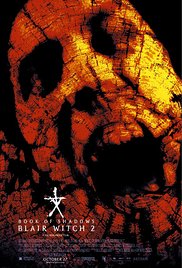 So what was a sequel possibly to do with this? If it just followed the same trajectory of the original, it would be panned as derivative and the conceit would already be old news by the time it was released in October of 2000. Studios needed a sequel to ride off the wave of profit that the first commandeered. However, what makes Book of Shadows intriguing, as a concept, has more to do with the man behind the camera, Joe Berlinger. I knew who Berlinger was before I knew his name. He directed the series of documentaries entitled Paradise Lost about the West Memphis Three who were accused and tried for murder of three eight-year-old boys. I had seen all three of these documentaries and was blown away when I realized it was the same guy who was directing the clunky mess in front of me.
So what was a sequel possibly to do with this? If it just followed the same trajectory of the original, it would be panned as derivative and the conceit would already be old news by the time it was released in October of 2000. Studios needed a sequel to ride off the wave of profit that the first commandeered. However, what makes Book of Shadows intriguing, as a concept, has more to do with the man behind the camera, Joe Berlinger. I knew who Berlinger was before I knew his name. He directed the series of documentaries entitled Paradise Lost about the West Memphis Three who were accused and tried for murder of three eight-year-old boys. I had seen all three of these documentaries and was blown away when I realized it was the same guy who was directing the clunky mess in front of me.
Nonetheless, they got a true documentarian to direct this sequel. He understood the difficulties, ethics and philosophical quandaries that documentarians find themselves in all the time. In true documentary style, he set out to make a film that recognized the mythology created in the first film as mythology in order to make a point about public hysteria and people’s ability to cling to the mythology even when its creators had been found out (Scientology, anyone??). And he set out to do it with a traditional film style unlike the original.
Berlinger fought with the studio on several things, but maybe the biggest upset was putting the opening credits on his film that read: “fictionalized re-enactment of events that occurred after the release of The Blair Witch Project.” While I understand his reasoning for disliking this decision, I am going to do something that seldom happens and side with the studio. First, I don’t believe it undercut Berlinger’s central point in the film, because his point is ham-fisted into nearly every single piece of dialogue and narrative he could place it. The films lack of subtlety came, brazenly, to a point where a character declares “it’s all HYSTERIA!”, in what I could only assume to be the greatest piece of overacting in 2000.
Second, I actually found that this idea of a dramatized re-enactment of the aftermath of The Blair Witch Project, a la Unsolved Mysteries or America’s Most Wanted, was able to help me overlook some of the cheesy moments, the bad acting and the incredibly bad characterization—along with its subsequent meta-commentary on its own bad characterizations! It also seems that this is the reverse of the “reality” of The Blair Witch Project. Where the original vied for the realistic, raw feeling of cinema verité by making a film that had, at one time, a whole country convinced of the content of its faux documentary style, Book of Shadows sought to become the original’s brother from another mother, the Jerry Springer/reality TV equivalent. It took what the original unearthed in the American psyche and made it sensationalized and overly dramatic.
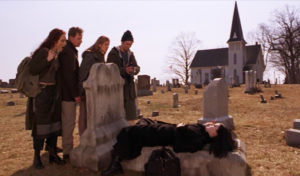 Where The Blair Witch Project sought to emulate and exploit the revelatory and authoritative nature of the documentary, Book of Shadows sought to take the actual truth and overlay it with a publicly derived, sensationalized vision of reality. It’s actually a little disheartening that Book of Shadows wasn’t a better film formally, because its vision for what we will settle for as truth may be just as enlightening in this day and age as the original film is. Both have something to tell us: the truth we receive isn’t always what it is cracked up to be whether derived from partisan external mediums or the “reality”-building with which we choose to believe (or deceive) ourselves. It is this that makes both of these films valuable in the broader conversation about horror.
Where The Blair Witch Project sought to emulate and exploit the revelatory and authoritative nature of the documentary, Book of Shadows sought to take the actual truth and overlay it with a publicly derived, sensationalized vision of reality. It’s actually a little disheartening that Book of Shadows wasn’t a better film formally, because its vision for what we will settle for as truth may be just as enlightening in this day and age as the original film is. Both have something to tell us: the truth we receive isn’t always what it is cracked up to be whether derived from partisan external mediums or the “reality”-building with which we choose to believe (or deceive) ourselves. It is this that makes both of these films valuable in the broader conversation about horror.


